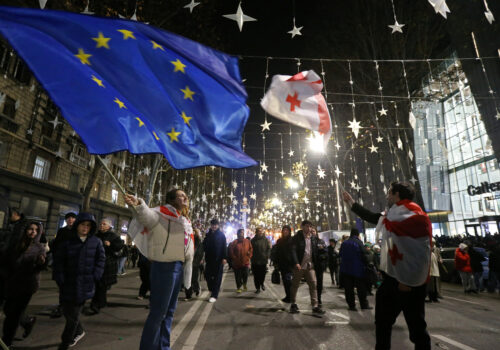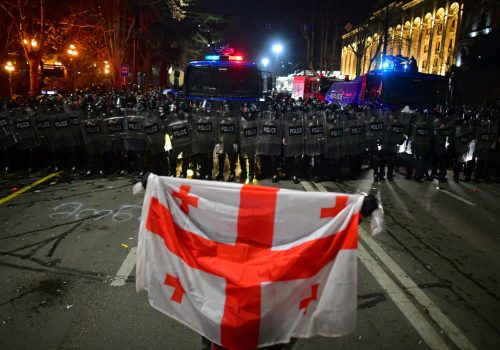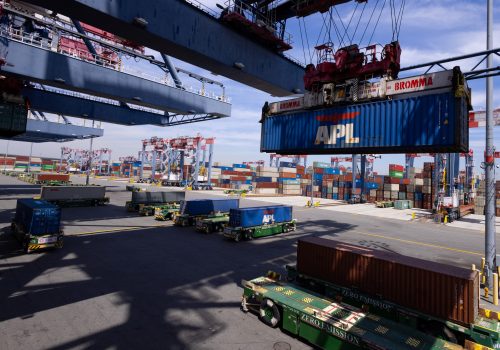What the EU can do now to strengthen economic ties with Ukraine and Georgia
Last month, the European Council decided to open European Union (EU) accession negotiations with Ukraine and to grant candidate status to Georgia. Regardless of how long it will take each country to meet the requirements and join the EU, the twenty-seven-member bloc should expand its existing capacity-building projects and trade ties with both of them now.
By doing so, the EU will leverage its economic power to support the fledgling democracies’ goal of balancing against Russia’s economic influence. In other words, the EU has an opportunity to demonstrate how positive economic statecraft—the use of economic incentives by a government to influence the behavior of another government—can encourage Ukraine and Georgia to further reduce their economic dependence on Russia and deepen ties with the West, even before their EU accession.
The first step will be for the EU to support additional capacity-building in Ukraine and Georgia by providing financial and technical assistance. This process will look different in each country’s case: For Ukraine, which must fight a full-scale war while making progress on meeting the EU’s accession requirements, financial and economic capacity-building will require immediate financial assistance for recovery. For Georgia, it will require training Georgian financial intelligence analysts and prosecutors on anti-money laundering and counter–terrorist financing best practices to prevent sanctions evasion through the Georgian banking system.
Ongoing projects
The EU already promotes positive economic statecraft with Ukraine and Georgia and is developing new tools that can be further expanded. For example, the EU is negotiating to establish the Ukraine Facility designed to support Ukraine, its recovery, and its path to EU accession, with plans to provide up to fifty billion euros for the period from 2024 to 2027. Even though Hungary vetoed the allocation of these funds to Ukraine in December while demanding that Brussels unfreeze Hungary’s funds, the EU will come back to this issue again next month. The establishment of this tool would show the EU’s long-term commitment to supporting Ukraine.
Moreover, the EU and Ukraine have an Association Agreement that promotes deeper economic ties through a Deep and Comprehensive Free Trade Area (DCFTA). To ensure Ukraine’s access to the EU’s common market, the Priority Action Plan allows for the free circulation of industrial goods, improves supply chain security, and explores the possibility of extending Ukraine access to the Single Euro Payments Area (SEPA).
Like Ukraine, Georgia also has an Association Agreement with the EU, which opened the EU market to Georgian businesses and products through the DCFTA and has allowed visa-free travel for Georgian citizens since 2017. The EU is Georgia’s largest financial assistance provider and also its largest trading partner. Furthermore, Tbilisi is working on solutions for increasing cross-border e-commerce with the EU by fifty percent. The EU has also invested in capacity-building projects in Georgia and has trained Georgian prosecutors and investigators in fighting money laundering, corruption, and terrorist financing.
Expanding cooperation
The EU should continue its capacity-building efforts with Ukraine and Georgia to ensure Ukraine has the financial assistance it needs for recovery, while both countries’ banking systems meet international anti-money laundering and counter-terrorism financing standards.
The most immediate action that the EU should take is to agree on the fifty billion euro financial aid to Ukraine during the special summit in Brussels on February 1. If Hungary keeps opposing the decision, the EU’s other options are to either give funding to Ukraine without Hungary’s approval or to distribute funding bilaterally. The EU’s hesitation with both options is understandable, given that they could both signal a weakening of the bloc’s unity. However, because of the unusual circumstances created by the war and Ukraine’s significance to Europe’s security from Russia, European leaders have signaled readiness to provide funding to Ukraine with or without Orbán’s support.
Moreover, as part of the EU’s positive economic statecraft strategy, Ukraine and Georgia should both be accepted into SEPA—Europe’s cross-border payment system that allows member states to make euro-denominated credit transfers in a few seconds. The SEPA zone is a significant element of the EU common market and would draw Ukraine and Georgia closer to the single market where cross-border trade is predominantly in euros. The opportunity to transact with European businesses and individuals with lower transaction costs will incentivize Ukraine and Georgia to comply with SEPA standards faster. This would also give the EU oversight of Ukraine’s and Georgia’s euro-dominated financial transactions.
This financial and technical assistance will help turn the enthusiasm on display in Ukraine and Georgia in December, when the start of accession talks was announced, into deeper and stronger connections with the EU.
Maia Nikoladze is the assistant director at the Economic Statecraft Initiative within the Atlantic Council’s GeoEconomics Center. Follow her at @Mai_Nikoladze.
Yulia Bychkovska is a young global professional at the Economic Statecraft Initiative within the Atlantic Council’s GeoEconomics Center. Follow her at @_YuliaB_.
Further reading
Thu, Jan 4, 2024
With Russia focused on Ukraine, Georgia should forge ahead boldly with its Euro-Atlantic ambitions
New Atlanticist By
Georgian officials should recognize the present opportunity to advance stronger ties with Europe and the United States, especially ahead of Georgian elections this year.
Thu, Aug 31, 2023
Russia is losing in Ukraine but winning in Georgia
UkraineAlert By
If Putin is able to reassert Russian dominance over Georgia while continuing to occupy 20% of the country, he will be encouraged to believe that a similar outcome will eventually prove possible in Ukraine, writes Giorgi Kandelaki.
Wed, Oct 18, 2023
Designing a US-EU industrial and trade policy
Issue Brief By
Both sides of the Atlantic are confronting the geopolitical necessity of adapting trade and industrial policies to be fit for purpose in an increasingly competitive world. To avoid competition between Washington and Brussels, policymakers must recognize each side’s priorities and commit to further cooperation to bridge the transatlantic economic relationship, not widen it.
Image: Georgia, Tbilisi, 2023-04-21. Support for Ukraine on the city walls with the Ukrainian, Georgian and European flag. Photograph by Antoine Boureau / Hans Lucas. Georgie, Tbilissi, 2023-04-21. Soutien a l Ukraine sur les murs de la ville avec le drapeau ukrainien, georgien et europeen. Photographie par Antoine Boureau / Hans Lucas.


